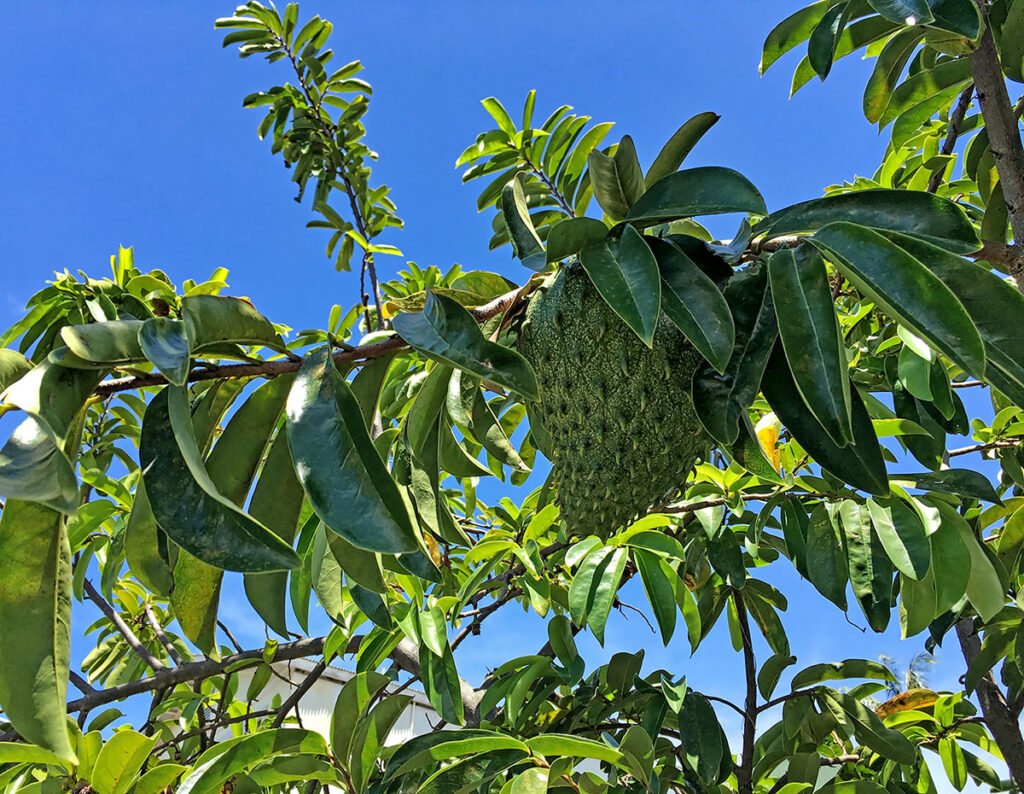Soursop leaves, derived from the Annona muricata tree, are an often-overlooked treasure of the tropical world. While the soursop fruit is widely celebrated for its unique taste and nutritional value, the leaves have gained recognition for their medicinal properties. From traditional uses in folk medicine to modern research on their bioactive compounds, soursop leaves have a growing reputation as a natural remedy for various health conditions.
In this article, we will explore the history, nutritional content, health benefits, supplement forms, and safety considerations of soursop leaves. By the end, you’ll have a deeper understanding of why this natural resource is gaining attention worldwide.
History and Cultural Use of Soursop Leaves
Botanical Background
Soursop, scientifically known as Annona muricata, belongs to the Annonaceae family, commonly referred to as the custard apple family. The tree produces the famous soursop fruit, but its leaves, bark, and seeds have also been utilized for their medicinal properties. Native to the tropical Americas, this tree thrives in humid climates with nutrient-rich soil.
Origins and Distribution
Soursop is believed to have originated in the tropical regions of Central and South America, particularly in the Amazon rainforest. Over time, it has spread to other parts of the world, including the Caribbean, Southeast Asia, and Africa, due to its adaptability and the popularity of its fruit and leaves in traditional medicine.
Traditional Uses
For centuries, indigenous communities in the Amazon and the Caribbean have relied on soursop leaves for their health benefits. These leaves were often brewed into teas to treat fever, insomnia, and digestive disorders. Additionally, the leaves were crushed into pastes for topical applications to alleviate skin inflammation and wounds. Their versatility made them a staple in traditional healing practices.
Common Names and Regional Terms for Soursop Leaves
Alternate Names
Soursop leaves are known by different names depending on the region. Common names include “Graviola,” “Guanabana,” and “Brazilian Pawpaw.” In some parts of the world, the tree is referred to as the custard apple tree due to its family lineage.
Regional Terminology
In Spanish-speaking countries, the plant is widely known as “hojas de guanábana,” while in English-speaking regions, the term “soursop leaves” is more prevalent. These regional differences reflect the plant’s widespread use across diverse cultures and geographic areas.
Nutritional Value of Soursop Leaves
Nutrient Profile
While soursop leaves are not typically consumed as food, their infusion in teas and extracts delivers significant health-promoting compounds. The leaves are rich in bioactive compounds like acetogenins, flavonoids, alkaloids, and tannins, all of which contribute to their medicinal properties.

Active Compounds
Acetogenins, the most studied compound in soursop leaves, are thought to have anti-cancer and anti-inflammatory properties. Additionally, the leaves contain antioxidants like polyphenols and flavonoids, which help combat oxidative stress in the body. These compounds are the primary reason soursop leaves are used in herbal remedies.
| Compound | Health Role |
|---|---|
| Acetogenins | Anti-cancer and anti-inflammatory properties |
| Flavonoids | Antioxidant activity, supports immune health |
| Alkaloids | Pain relief and relaxation |
| Tannins | Antimicrobial and digestive support |
Health Benefits of Soursop Leaves

1. Anti-Cancer Potential
Soursop leaves have gained attention for their potential anti-cancer properties due to the presence of acetogenins. These bioactive compounds are believed to selectively target and inhibit the growth of cancer cells without harming healthy cells. Laboratory studies have shown promising results against breast, liver, and prostate cancers, highlighting their therapeutic potential.
Furthermore, acetogenins work by disrupting the energy production of cancer cells, effectively “starving” them. While human studies are still limited, ongoing research suggests that soursop leaves could serve as a natural complement to conventional cancer treatments. However, it is essential to use them responsibly under medical supervision.
2. Anti-Inflammatory Properties
Soursop leaves are rich in antioxidants, which help combat inflammation in the body. This makes them particularly useful for managing conditions like arthritis and other inflammatory disorders. The compounds in the leaves work to reduce oxidative stress, which is often a precursor to chronic inflammation.
In traditional medicine, soursop leaf tea has been used to alleviate swelling and pain. Modern research supports these claims, indicating that the leaves may help lower inflammatory markers, improving overall joint and muscle health. Regular consumption in moderate amounts can be beneficial for individuals with inflammatory conditions.
3. Supports Immune Health
The high antioxidant content of soursop leaves helps strengthen the immune system by neutralizing free radicals that can damage cells. Compounds like flavonoids and tannins contribute to their immune-boosting effects, making the leaves a natural choice for improving resilience against infections.
By supporting cellular health, soursop leaves may also reduce the risk of chronic illnesses linked to oxidative damage. Drinking soursop leaf tea regularly can be a simple way to bolster immune defense, especially during cold and flu season.
4. Improves Digestive Health
Soursop leaves are known for their soothing effects on the digestive system. They help reduce acidity in the stomach, which can alleviate symptoms of indigestion and heartburn. Additionally, their antimicrobial properties may protect against harmful bacteria in the gut, promoting a balanced microbiome.
In traditional medicine, soursop leaf tea has been used to treat stomachaches and ulcers. Its tannin content helps strengthen the lining of the digestive tract, reducing the risk of ulcers and other gastrointestinal issues. Regular use may improve overall digestive comfort.
5. Relieves Anxiety and Enhances Sleep
Soursop leaves have natural sedative properties that make them effective for reducing stress and anxiety. The leaves contain alkaloids that influence neurotransmitter activity, helping the body relax and promoting a sense of calm.
In addition to reducing anxiety, soursop leaf tea is commonly used as a natural remedy for insomnia. Drinking a warm cup of this tea before bed can improve sleep quality, allowing for more restful and restorative sleep. This dual effect on mental well-being makes it a popular choice for stress management.
6. Manages Blood Sugar Levels
Preliminary research suggests that soursop leaves may help regulate blood sugar levels, making them a potential ally for individuals with diabetes. The leaves are thought to inhibit enzymes that convert complex carbohydrates into glucose, thereby slowing sugar absorption in the bloodstream.
In addition to their glucose-regulating effects, soursop leaves may improve insulin sensitivity, enhancing the body’s ability to use insulin effectively. Regular consumption of soursop leaf tea or supplements, when guided by a healthcare provider, could support blood sugar management.
7. Supports Skin Health
Soursop leaves are often used topically to treat skin conditions like acne, inflammation, and minor wounds. Their antimicrobial properties help reduce bacteria on the skin’s surface, promoting faster healing and clearer skin.
In addition to external use, drinking soursop leaf tea can provide antioxidants that improve skin health from within. These compounds combat oxidative damage, reducing signs of aging and promoting a youthful appearance. Soursop leaves offer a natural way to maintain glowing, healthy skin.
Soursop Leaf Supplements and Uses
Supplement Forms
Soursop leaves are available in various forms, including dried leaves for tea, powdered supplements, capsules, and liquid extracts. These forms allow for convenient consumption, catering to different preferences and lifestyles.
How to Use Soursop Leaf Supplements
To prepare soursop leaf tea, boil 3-5 dried leaves in water for 10-15 minutes. Capsules and powders are typically taken according to the manufacturer’s instructions, with dosages ranging from 500 mg to 1500 mg per day. Always consult a healthcare provider for personalized guidance.
Choosing High-Quality Supplements
Look for organic, non-GMO, and third-party tested products to ensure purity and potency. High-quality supplements are free from harmful additives and provide standardized extracts for consistent benefits.
Potential Side Effects and Cautions with Soursop Leaves
Precautions for Use
Although soursop leaves offer many health benefits, consuming them in excessive amounts can be harmful. Certain compounds in the leaves, such as acetogenins, can be toxic at high doses.
Known Side Effects
Possible side effects include nausea, digestive upset, and low blood pressure. Individuals with pre-existing conditions should consult a healthcare provider before use to avoid adverse reactions.
Drug Interactions
Soursop leaves may interact with medications for diabetes, hypertension, and neurological conditions. Their potential to lower blood sugar and blood pressure can amplify the effects of prescription drugs, leading to unintended complications.
Contraindications
Pregnant and breastfeeding women should avoid soursop leaves due to insufficient research on their safety during pregnancy. Additionally, those with neurological disorders should exercise caution, as some studies suggest a link between acetogenins and neurotoxicity with prolonged use.
Conclusion
Soursop leaves are a powerful natural remedy with a wide range of potential health benefits, from supporting immune health to managing blood sugar levels and promoting relaxation. However, like any herbal remedy, they should be used responsibly and in moderation. While traditional medicine has long valued these leaves, modern research continues to uncover their therapeutic potential.
For those looking to incorporate soursop leaves into their wellness routine, consulting a healthcare provider is essential, especially if you are taking medications or have underlying health conditions. With proper use, soursop leaves can be a valuable addition to a healthy lifestyle.

Join the 7‑Day “Better Gut” Plan
Pop in your email and we’ll send Lesson 1 + the printable list.









